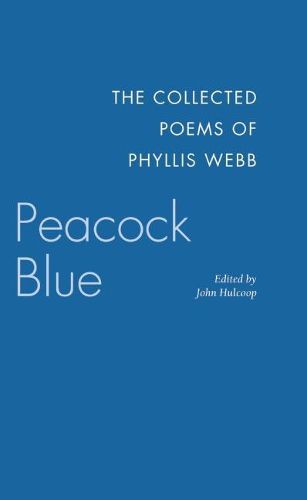Readings Newsletter
Become a Readings Member to make your shopping experience even easier.
Sign in or sign up for free!
You’re not far away from qualifying for FREE standard shipping within Australia
You’ve qualified for FREE standard shipping within Australia
The cart is loading…






When Phyllis Webb published Wilson’s Bowl in 1980, Northrop Frye hailed it as a landmark in Canadian literature : landmark, an event that marks a turning point in something (in this case, Canadian literature); and an instantly recognized feature of a landscape (in this case, the landscape of Canadian poetry). Wilson’s Bowl was Webb’s fifth volume of poetry. Three more followed and then she fell silent, turning from literature to abstract painting. Peacock Blue compiles in a single volume all of Webb’s published, unpublished, and uncollected works from a writing career that spanned fifty years. It offers readers the opportunity to relish the arc of Webb’s entire poetic oeuvre, from the modernist lyricism of her early works, to the groundbreaking volume Naked Poems (1965), in which Webb created for herself a new minimalist language; from Wilson’s Bowl to what Douglas Barbour calls Webb’s loving and subversive engagement with the ghazal in Water and Light (1984); and finally to the postmodernist prose poems of Hanging Fire (1990). The concluding section of Peacock Blue contains almost fifty poems previously uncollected, some of which have never been published before. It is full of brilliant but forgotten poems and poetic surprises. Brenda Carr has suggested that one of Webb’s later essays, Message Machine (1990), initiates a re-reading of her poetics and practice … Against her anxiety that she is a passive ‘message machine’ for masculinist culture … Webb posits another possibility - ‘cross-dressing.’ She theorizes her mimicry of the male persona as analogous to a ‘masquerade’ or ‘street theatre’ and in so doing reconstructs even her earlier poems as a performative space in which agency is possible. The truth of Carr’s insight becomes increasingly apparent to anyone who undertakes to read through Webb’s entire poetic output, gathered together, at last, in Peacock Blue.
$9.00 standard shipping within Australia
FREE standard shipping within Australia for orders over $100.00
Express & International shipping calculated at checkout
Stock availability can be subject to change without notice. We recommend calling the shop or contacting our online team to check availability of low stock items. Please see our Shopping Online page for more details.
When Phyllis Webb published Wilson’s Bowl in 1980, Northrop Frye hailed it as a landmark in Canadian literature : landmark, an event that marks a turning point in something (in this case, Canadian literature); and an instantly recognized feature of a landscape (in this case, the landscape of Canadian poetry). Wilson’s Bowl was Webb’s fifth volume of poetry. Three more followed and then she fell silent, turning from literature to abstract painting. Peacock Blue compiles in a single volume all of Webb’s published, unpublished, and uncollected works from a writing career that spanned fifty years. It offers readers the opportunity to relish the arc of Webb’s entire poetic oeuvre, from the modernist lyricism of her early works, to the groundbreaking volume Naked Poems (1965), in which Webb created for herself a new minimalist language; from Wilson’s Bowl to what Douglas Barbour calls Webb’s loving and subversive engagement with the ghazal in Water and Light (1984); and finally to the postmodernist prose poems of Hanging Fire (1990). The concluding section of Peacock Blue contains almost fifty poems previously uncollected, some of which have never been published before. It is full of brilliant but forgotten poems and poetic surprises. Brenda Carr has suggested that one of Webb’s later essays, Message Machine (1990), initiates a re-reading of her poetics and practice … Against her anxiety that she is a passive ‘message machine’ for masculinist culture … Webb posits another possibility - ‘cross-dressing.’ She theorizes her mimicry of the male persona as analogous to a ‘masquerade’ or ‘street theatre’ and in so doing reconstructs even her earlier poems as a performative space in which agency is possible. The truth of Carr’s insight becomes increasingly apparent to anyone who undertakes to read through Webb’s entire poetic output, gathered together, at last, in Peacock Blue.